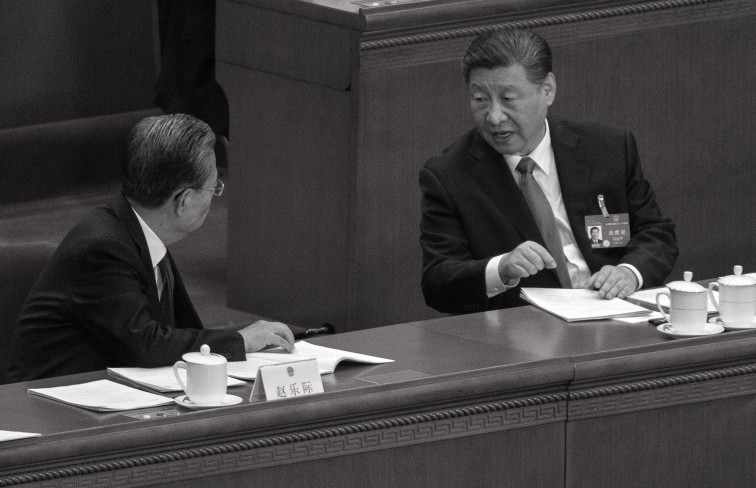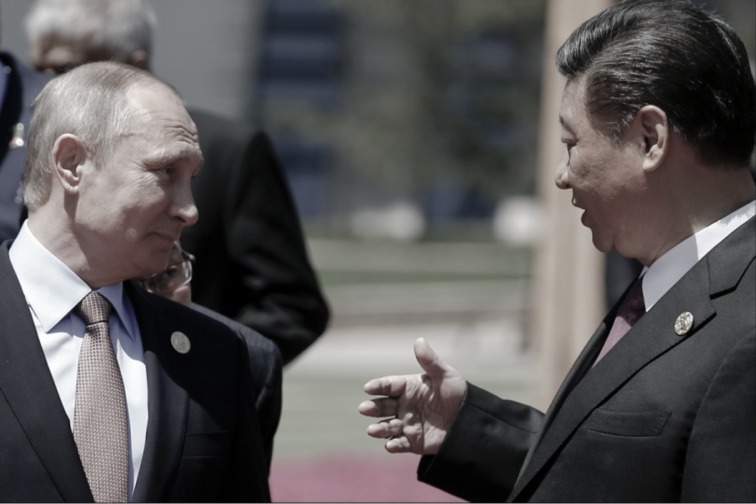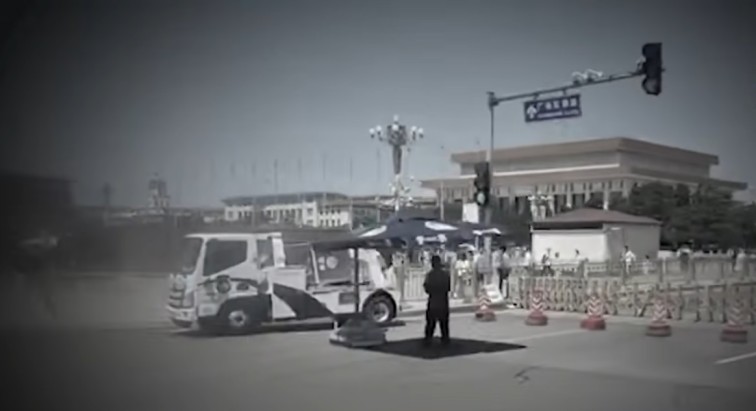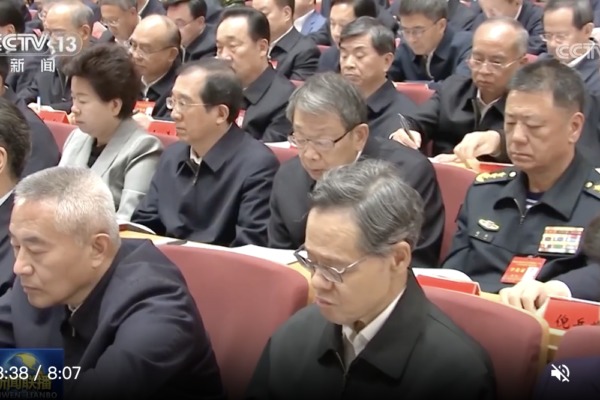Xi Jinping (Illustration by Qing Yu/People News)
[People News] From August 31 to September 2, it was arguably Xi Jinping’s moment in the spotlight. After speculation that he had “lost power,” Xi once again dominated the headlines. On the surface, it appeared he was working to establish a new global security and economic order, directly challenging the United States. But behind the scenes, there were hidden agendas.
1. Military Parade – Preparing for an Invasion of Taiwan or Addressing Internal Crises?
At the Shanghai Cooperation Organization (SCO) summit, Xi Jinping repeatedly emphasized: “We must continue to firmly oppose hegemony and power politics, and practice genuine multilateralism.” Putin responded that the SCO had revived “true multilateralism.” Does this mean the CCP truly wants to promote world peace? Or is there another motive—such as what CCP propagandist Jin Canrong said: that Beijing is preparing to forcibly unify Taiwan and stockpile two years’ worth of grain?
Some observers believe Beijing’s constant talk of “unifying Taiwan by force” is merely rhetoric, with the real obstacle being risks of internal division. Media figure Zhou Mingfeng analyzed that as early as 2015, he had noticed this “fatal weakness” of the CCP. “CCP officials are not patriotic,” he said. “They are insiders working for outside forces.”
Rumors abound of corruption and disloyalty—for example, Zhejiang Governor Wang Hao allegedly gave 800 million yuan to Peng Liyuan before being promoted to Party Secretary, and Yichun Party Standing Committee member Xu Zhaojun reportedly spent 80 million yuan to become Jixi Party Secretary. Officialdom has become a marketplace where loyalty is replaced by money.
Zhou further revealed that when he reported State Security Ministry official Lin Gang’s collusion with foreign powers in Myanmar, the case was dismissed. He concluded that if war breaks out, the state security apparatus would be the first to defect.
Recent scandals seem to support his claim: in 2023, state security officer She Zhijiang was arrested in Thailand with 2.1 billion yuan seized, and officer Guo Huaping was arrested in Cambodia with 7 billion yuan seized. Within state security are numerous “criminal masterminds.” In times of crisis, they are more likely to protect themselves than show loyalty, as their wealth cannot withstand CCP audits and their exposure abroad makes them doubt Beijing’s narrative.
Meanwhile, Zhou and other media figures suggest that China’s northeast shows signs of a revived “Manchukuo,” while in Shaanxi, some push for independence and even the creation of an “Islamic State.”
Public records show that on May 16, 2012, Islamic associations were set up in Xi’an, Baoji, Hanzhong, and Xianyang. In 2023, Shaanxi held the 40th anniversary of its provincial Islamic association.
Historically, during the Qing Dynasty’s Tongzhi era (mid-19th century), Shaanxi saw the 12-year “Dungan Revolt” or “Shaanxi-Gansu Hui Uprising.” While there is no concrete evidence that Shaanxi will establish an Islamic State, the northeast indeed has overseas dissident groups—such as Sheng Xue’s team—calling for the restoration of “Manchukuo.”
Overall, the CCP uses multilateralism externally to ease U.S. pressure, while internally it must address corruption and separatist risks. Under such conditions, talk of forcibly unifying Taiwan remains largely empty rhetoric.
2. The CCP Fears War and Internal Division
During the 2015 Lunar New Year, the Kokang Alliance Army launched a military operation to retake territory lost in 2009 but was crushed by Myanmar’s army and forced to retreat to guerilla bases along the Salween River. Under Chinese pressure, the group declared a unilateral ceasefire in June, and Beijing continued to act as mediator.
To secure peace in Myanmar, Beijing provided vast financial aid: in 2015 alone, 10 million yuan plus $33.6 million in funds, additional agricultural and police equipment loans, and a $300 million loan agreement through China’s Export-Import Bank, alongside a $39 million concessional loan. This reflected Beijing’s fear of war erupting on its borders.
Zhou Mingfeng offered a sharper view: the CCP fears war spreading to its own territory and sparking internal division, hence it spends heavily to prevent regional conflicts. He also noted that the Ministry of State Security’s stance aligned with the Kokang Army, whose leader was allegedly a CIA asset. Zhou claimed to have obtained documents in Myanmar showing that more than 1,000 senior CCP security officials work for U.S. and Russian intelligence.
At that time, the Minister of State Security was Geng Huichang, with Ma Jian as Vice Minister. Ma was later exposed by Guo Wengui for possessing compromising videos of officials, while Geng was believed to have close ties to Zhou Yongkang. Zhou concluded that Xi Jinping’s crackdown on Zhou Yongkang’s network had fueled internal fractures—and that Washington had already identified this vulnerability.
3. Xi Jinping’s Darkened Face May Be Linked to a Kidney Transplant
On September 2, media commentator “Jili Xiaoshimei” used the I Ching to predict Xi Jinping’s health, producing a hexagram indicating lingering illnesses including liver disease, kidney disease, and cardiovascular problems. It suggested Xi had undergone a kidney transplant in May. Nephrology experts note that transplant patients must take long-term immunosuppressants such as cyclosporine or tacrolimus, which disrupt hemoglobin metabolism, damage the liver, and cause facial darkening.
The reading also suggested Xi will need a liver transplant early next year to survive. Previously, commentator Wang Jizhou predicted Xi’s days were numbered, and that even advanced medicine could not restore his health.
Videos of Xi during his Tibet visit, SCO summit, and the military parade show him walking unsteadily and with involuntary head tremors. His darkened complexion indeed matches signs of abnormal hemoglobin metabolism.
During a visit to Yangquan, Shanxi, Xi reportedly kept a 5-meter distance from others—consistent with transplant patients whose lowered immunity requires avoiding crowds.
At the September 3 parade, CCTV footage showed Xi walking toward Tiananmen Square alongside Kim Jong-un and Putin. Through a translator, Putin remarked: “Human organs can be transplanted again and again, making people younger, perhaps even immortal.” After laughter, Xi responded: “Perhaps, in this century, humans may live to 150.” Kim Jong-un appeared very intrigued.
With Xi’s health problems mounting, and divisions and corruption within the Party unresolved, sudden political upheaval in China is not impossible.











News magazine bootstrap themes!
I like this themes, fast loading and look profesional
Thank you Carlos!
You're welcome!
Please support me with give positive rating!
Yes Sure!